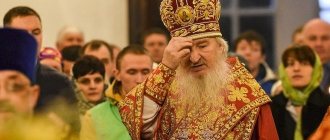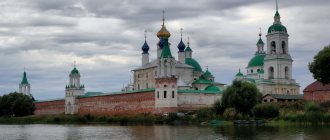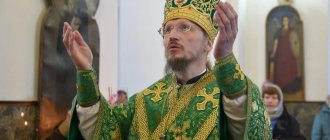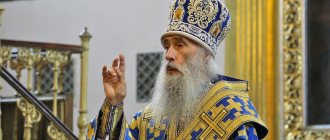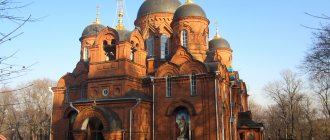Who overthrew the dictator: who was the Metropolitan of Montenegro during his lifetime
Amphilochius is a worthy heir to his holy ancestors.
In Montenegro, Serbia and Republika Srpska, on the morning of October 30, one of the most tragic days began not only in 2022, but in the entire new Serbian history. Metropolitan Amfilohije Radovich of Montenegro and Littoral presented himself to God, a man who, with his contribution to the restoration of Orthodoxy in Montenegro, defeated the 75-year-old political regime in Montenegro and the 30-year power of the last dictator of southeastern Europe, Milo Djukanovic.
Serb believers considered him the most authoritative bishop of the Serbian Orthodox Church (SOC) and the second most influential person within the SOC, after Archbishop Irinej Bulovich of Novisad.
Amfilohije Radović was born on January 7, 1938 in the village of Bare Radovića in Lower Moraca (Kolašin community in Montenegro) to father Cir and mother Mileva (née Bakić); At baptism he received the name Risto.
Moraca graduated from primary school at the monastery. I studied in a small Montenegrin town (however, all the towns there are small) Bar at the Moraca monastery. In 1958 he graduated from the Belgrade Theological Seminary. In 1962 he graduated from the Theological Academy of St. Sava in Belgrade; studied at the Faculty of Philosophy of the University of Belgrade, specializing in classical philology, then in Bern (Switzerland) and in Rome.
© AP/TASS
In 1967, in Athens, Metropolitan Procopius of Cephalinia was tonsured a monk with the name Amphilochius. In 1968, he was ordained a priest in the city of Argostoli (Greece), and in the same year he was elevated to the rank of archimandrite. In 1968-1973 he carried out pastoral service in the parishes of Spata and Koropion (Greece).
On June 17, 1973, he defended his doctoral dissertation “The Mystery of the Holy Trinity according to the teachings of St. Gregory Palamas" (in Greek).
He spent a year on the Holy Mountain, from where he was sent to teach in Paris at the St. Sergius Orthodox Theological Institute. Archimandrite Justin (Popovich), theologian and confessor, and the Svyatogorsk elder Paisius Svyatogorets had a great influence on him.
Since 1976, he has been a teacher at the Department of Orthodox Pedagogy at the Belgrade Theological Academy of John the Theologian.
In May 1985 he was elected Bishop of Banat with a see in the city of Vršac. On June 16 of the same year, his episcopal consecration took place, which was performed by: Patriarch Herman of Serbia, Metropolitan Procopius of Cefallinia (Hellenic Orthodox Church), Bishop Stefan (Botsa) of Zhich, Bishop Savva (Vukovic) of Shumadia, and Bishop Nicholas of Dalmatia (Mrdja).
On December 30, 1990, he was elevated to the rank of Metropolitan of Montenegro and Littoral, Zeta-Brd and Skenderija and Exarch of the Holy Throne of Pecs. In Cetinje, in 1992, the work of the Cetinje Theological Seminary, closed in 1945, was resumed. He founded the magazine “Svetigora”, as well as the publishing center of the same name. He renovated and rebuilt a large number of churches and monasteries in Montenegro, which contributed to a significant increase in the number of clergy and monks in the diocese.
On May 6, 2006, by special invitation, he arrived at the IV All-Diaspora Council of the ROCOR, which opened the next day. On May 9, without waiting for the end of the council, he left for his diocese, citing the difficult situation of Orthodoxy in the Balkans.
Due to the hospitalization of Patriarch Pavlo since November 13, 2007, the Council of Bishops of the Serbian Church, which opened on May 15, 2008 in Belgrade, decided to temporarily transfer the functions of the primate to the Holy Synod, headed by Metropolitan Amfilohije.
© AP/TASS
On the day of the death of Patriarch Pavlo, November 15, 2009, at an emergency meeting of the Holy Synod of the Serbian Church, he was elected locum tenens of the Serbian Patriarchal Throne.
From May 21 to November 18, 2010, he was the temporary administrator of the Rasha-Prizren diocese.
He called the gay pride parade in Belgrade on October 10, 2010 “a poison that is spilling through the streets of Belgrade,” adding that it is “more terrible than uranium.” The Metropolitan also said that Sodom had infected “modern civilization” and “risen to the pedestal of deity,” and therefore called for a boycott of the procession. LGBT representatives accused Metropolitan Amfilohije of homophobia: a member of the Committee for the Protection of the Rights of Sexual Minorities of Serbia, Nevena Petrusic, demanded an apology, otherwise threatening legal action. The Metropolitan refused to apologize.
On May 26, 2011, the Diocese of Buenos Aires was formed, which includes parishes in South and Central America. Metropolitan Amfilohiy was appointed administrator of the newly created diocese.
For the phrase “whoever destroys the church, may God destroy him and his descendants”, he was accused of trying to incite hatred and curse the government of Montenegro, and therefore on June 23, 2011 he was summoned to court, which, at the request of the Metropolitan, was postponed to a later time. If the court's decision is positive, the metropolitan faces a fine.
On February 11, 2015, in the academic assembly hall, the rector of the St. Petersburg Theological Academy, Archbishop of Peterhof Ambrose (Ermakov), presented Metropolitan Amphilochius with a doctoral cross and a diploma conferring the degree of honorary doctor of the St. Petersburg Orthodox Theological Academy.
In October 2015, in Chambesy, he led the delegation of the Serbian Orthodox Church during the Fifth Pan-Orthodox Pre-Conciliar Meeting.
Analysts believe he was behind the Serbian Church's decision to ultimately take part in the Pan-Orthodox Council in Crete in June 2016. In 2022, he criticized the non-participation of the Moscow Patriarchate in the Pan-Orthodox Council.
In a number of his speeches, he condemned the actions of the Ecumenical Patriarchate in Ukraine, in particular, stating: “His [Patriarch Bartholomew’s] lust for power led to great troubles in Ukraine, to division, which is catastrophic for the future of not only Ukraine and all Slavic peoples, but at the same time time for all Orthodoxy”, “The Patriarch of Constantinople does not have the right to call himself the head of the Orthodox Church, as is written in the Ukrainian tomos. The Church has only one head, and that is Christ.”
© EPA/TASS
In January 2022, the ruling Democratic Party of Socialists of Montenegro (DPS) condemned Metropolitan Amfilohije for “primitive and obscene attacks” with which he, during his sermon before the Podgorica Resurrection Cathedral on the Nativity of Christ, in the opinion of the DPS, insulted and humiliated “the believers of the Montenegrin Church, himself himself, and above all the high ecclesiastical rank of metropolitan"; DPS appealed to the government authorities of Montenegro, calling on them to establish the presence of elements of hate speech in the incident (among other things, Metropolitan Amfilohije in his speech condemned the government of Montenegro for “creating a false church,” recognizing Kosovo and joining sanctions against Russia). Petitions to initiate a criminal case against him under Articles 169 and 370 of the Criminal Code of Montenegro in connection with this incident were also submitted to the Prosecutor's Office of Montenegro by other public organizations in Montenegro.
Archbishop of Cetinje, Metropolitan of Montenegro and Exarch of the Holy See of the city of Pecs, Amfilohije, after receiving the Holy Mysteries of Christ, rested in the Lord in the central clinical hospital of Montenegro on Friday, October 30, at 8:20 am, on the eve of the feast of St. Peter of Cetinje.
Many who met Amphilochius saw that he was a very unusual person. Actor Jeremy Irons commented on the meeting with Metropolitan Amphilochius: “The meeting with Metropolitan G. Amphilochius was such that I forgot about the film and everything connected with it. This meeting became one of the most exciting events in my life. I may be a famous actor, but spiritually I am a very ordinary person, and meeting such a person as your Metropolitan in Montenegro is something unusual. The moment he entered the office, I realized that this was a rare man in front of me. It doesn’t happen so often, maybe two or three times in my life I had the honor of meeting such a person...” After the meeting, Jeremy leaned his head on the Metropolitan’s chest and began to cry.
Activities of Metropolitan Amphilochius during the Balkan Wars
| There is disagreement about the neutrality of the point of view of the current version of this article or section. You can check out the discussion on the talk page. |
Characteristics of his nationalist thought
Vladika Amfilohije, the Serbian metropolitan of Montenegro, is particularly known for her public embrace of nationalist ideology.
An analyst for the Spanish newspaper La Vanguardia wrote the following in a column on international politics on June 20, 2008:
“Milosevic's wars with massive Western intervention in favor of the centrifugal Yugoslav nations awakened an increasingly aggressive nationalism in the Serbian Church. The maximum representative of this line is Metropolitan Amphilohiy.” [6]
The newspaper La Nación of the Argentine Republic, in a note published on November 16, 2009, describing the profile of Bishop Amfilohije, seeking to become the successor of the late Serbian Patriarch Paul, does so as follows:
"The influential Bishop Amphilochios (is) a conservative nationalist known for his stance against Western standards." [7]
His attitude towards the war in Croatia
On July 12, 1991 - during the Yugoslav army's attack on Croatia - Bishop Amfilohije received at the Cetinje Monastery Željko Raznatović, better known as Arkan, [ ] who in those days led a large group of Serbian paramilitary forces Tigrovi. - tigers - so called for their sudden, lightning-fast attacks of great ferocity. Arkan, together with his "militants", became - at that time - the actual "guardians" of the monastery of St. Peter of Cetinje, where Bishop Amfilohije lived. [ ]
In the cold autumn of November 1991, Metropolitan Amfilohije crossed the borders of Montenegro and his ecclesiastical jurisdiction to monitor and preach to the Serbian army advancing towards Croatia to carry out the siege of the Croatian city of Dubrovnik. singing folk songs with his guzla to the Serbian troops, such as "Mojkovačka bitka", trova, referring to the Battle of Mojkovac, where the Montenegrins fought against the Austro-Hungarian army in 1916 -. Meanwhile, the stationed Serbian troops began a relentless bombardment of the city, a siege that lasted six months. He also visited the Montenegrin reservists of the "Veljko Vlahović" Brigade in Podgorica, to whom he presented crucifixes and icons, urging them to enthusiastically join the Serbian government's invasion of Croatia. [ 10 ]
His attitude to the war in Bosnia and Herzegovina
During the war in Bosnia and Herzegovina, Bishop Amfilohije became close friends with Radovan Karadžić. During the war years, when Karadžić served as President of the Republika Srpska, Vladika Amfilohije often visited him and preached to his criminal army, inciting them to continue the war to the bitter end. It is well known that Amfilohije actively worked with Serbian minorities to get them to reject the 1993 UN Peace Plan, known as the Vance-Owen Plan. On the night when the Serbs rejected the peace plan, Bishop Amfilohije himself declared that "They were inspired by Saint Lazarus"
(famous Serbian medieval saint and warrior hero who fought against the Ottoman invasion), adding:
“They chose, like the Holy King Lazarus ... the Kingdom of Heaven ”
[ ]
In this political context, the Serbian Bishop of Montenegro, Amfilohije, awarded Radovan Karadžić (President of Republika Srpska between 1992 and 1996) the Order of Njegoš in recognition of his political and military actions in Bosnia and Herzegovina. [ 12 ]
